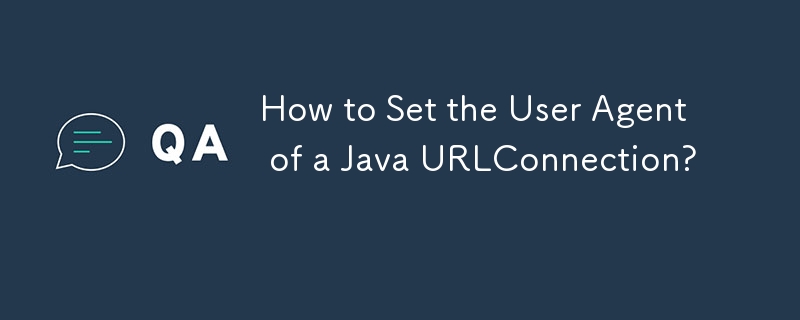

When utilizing URLConnection to parse webpages in Java, it's crucial to set the user agent correctly. However, by default, the specified user agent is appended with "Java/1.5.0_19." This can be a concern when trying to conceal or impersonate a particular browser.
Clarification and Resolution
In Java versions 1.6.30 and later, the issue with user agent appending no longer exists, and setRequestProperty("User-Agent", "Mozilla ...") works as intended. To verify this, a port listener can be set up to capture HTTP headers.
When a request is sent without setRequestProperty being utilized, the HTTP headers will include:
User-Agent: Java/1.6.0_30
However, when setRequestProperty is used to set a specific user agent, the HTTP headers will reflect the specified value:
User-Agent: Mozilla/5.0 (Macintosh; U; Intel Mac OS X 10.4; en-US; rv:1.9.2.2) Gecko/20100316 Firefox/3.6.2
Example Code
The following code provides a complete example of how to set the user agent and retrieve the content type of a webpage:
import java.io.IOException;
import java.net.URL;
import java.net.URLConnection;
public class TestUrlOpener {
public static void main(String[] args) throws IOException {
URL url = new URL("http://localhost:8080/foobar");
URLConnection hc = url.openConnection();
hc.setRequestProperty("User-Agent", "Mozilla/5.0 (Macintosh; U; Intel Mac OS X 10.4; en-US; rv:1.9.2.2) Gecko/20100316 Firefox/3.6.2");
System.out.println(hc.getContentType());
}
}The above is the detailed content of How to Set the User Agent of a Java URLConnection?. For more information, please follow other related articles on the PHP Chinese website!
 How to buy Bitcoin
How to buy Bitcoin
 How to use the norm function in python
How to use the norm function in python
 How the tcp three-way handshake works
How the tcp three-way handshake works
 The difference between currentregion and usedrange
The difference between currentregion and usedrange
 Is java front-end or back-end?
Is java front-end or back-end?
 How to solve the problem that the print processor does not exist
How to solve the problem that the print processor does not exist
 Introduction to SEO diagnostic methods
Introduction to SEO diagnostic methods
 What is a browser plug-in
What is a browser plug-in




